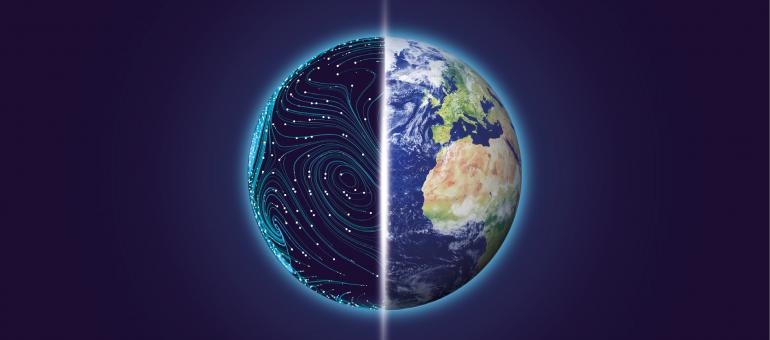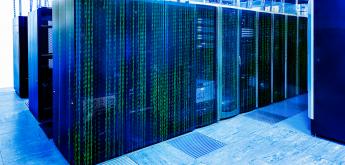Artificial Intelligence is Using a Ton of Water. Here’s How to Be More Resourceful

Artificial intelligence (AI) quickly went from a neat parlor trick to a business imperative. IBM reports that 82% of large enterprises have either deployed AI or are experimenting with doing so. Unlike other technology innovations like smartphones or WiFi networks, AI isn’t a one-time integration. The technology is constantly evolving with new models and capabilities.
Each time these AI tools are prompted, there’s a cost that few consider. Researchers believe that each string of prompts uses roughly 16 ounces of water at data centers that house these AI systems. Extrapolate AI use globally, and it’s clear how water systems are taxed. Microsoft’s latest environmental report shows its water consumption jumped 34% from 2021 to 2022, reaching nearly 1.7 billion gallons. Google reports its water consumption went up nearly 22% over the same period to a staggering 5.56 billion gallons, about 800 times as big as The Lincoln Memorial reflecting pool.
Clearly, the AI revolution isn’t going away — Gartner says 90% of companies will have adopted AI by next year. Unchecked water usage by power-hungry data centers could exacerbate the already dire water crises worldwide.
This urgency is why Veolia | Water Tech is devoted to an ecological transformation where sustainable solutions can help reduce the world’s water footprint. In fact, Veolia is using generative AI to solve the problem. Through its GreenUp initiative, Veolia uses AI to assist in its annual savings plan, optimizing customers’ water and energy consumption as well as waste sorting and recycling and strengthening predictive maintenance.
Why data centers are so thirsty for water
The massive water consumption by data centers stems from their need to maintain optimal temperatures for densely packed servers and computing hardware racks. Just like a car engine, these components generate immense amounts of heat. Overheating can cause system failures, data corruption, and costly downtime. Data centers also use water for humidification systems that maintain a specific humidity range to ensure the functionality of all the equipment in the building.
Keeping temperatures in check requires industrial-scale cooling systems that continuously circulate water. A single data center can have cooling towers that need millions of gallons of water annually to prevent the critical computing infrastructure from overheating.
As water needs continue to grow, data centers may struggle to keep pace. In drought-prone regions, some facilities may even face tough choices between shutting down operations or overtaxing municipal water supplies that communities rely on.
The data center industry’s outsize water footprint is increasingly at odds with the global water scarcity crisis. The World Wildlife Federation projects that 66% of the global population is likely to face water scarcity by next year. Water is a precious, limited resource, and companies have a responsibility to adopt sustainable water management practices.
Download the Solutions for Data Centers Overview Brochure
Veolia’s water reuse solutions
Forward-thinking data centers are turning to water reuse and recycling technologies to reduce their water footprints and costs. Veolia has pioneered comprehensive water treatment solutions that enable facilities to cut their water usage drastically.
A data center in Illinois sought a new water treatment strategy to reduce its dependency on the municipal water supply and turned to Veolia for help. Our experts determined that the existing alkaline cooling system was limiting the cooling tower’s cycles of concentration and caused high blowdown rates that increased demand for make-up water.
Veolia installed a TrueSense* Ready-Set-Go (RSG) controller to monitor pH and feed the sulfuric acid into the cooling system to simplify management for the data center’s operators and leverage remote monitoring and alarms. The new treatment program doubled the cooling tower cycles and reduced the amount of water needed to operate the system by 50%. The result was 12 million gallons of water saved annually and $150,000 in associated cost savings.
In Virginia, a data center faced escalating costs from softening its hard well water before use — two softeners processed more than 20 million gallons of well water. It cost $160,000 in brine salt and maintenance. Veolia conducted an analysis and developed a two-step treatment solution. The first step was installing a new TrueSense control system that provides continuous, online monitoring. Second, the new system adjusted the acid feed to maintain a target pH level so that the well water would no longer need to be softened. The new treatment program rendered the water softeners obsolete. They were decommissioned, creating $114,000 in annual savings.
Finding sustainability as technology evolves
As the AI revolution accelerates demand for data centers, and thus water cooling, investing in water reuse and recycling technologies is an operational and environmental imperative. For example, the Hubgrade* Water Footprint, a new Veolia solution, offers full visibility into water operations. The platform drives actionable insights to help customers reduce their water footprint, water-related energy use, and greenhouse gas emissions.
Veolia piloted Hubgrade Water Footprint at one of its small plants and created early wins like more than 20,000 kilograms of emissions reduced by piped natural gas (PNG) usage. The platform is expected to expand to more than 15 global Veolia sites this year to drive new sustainability efforts and would provide the same benefit to data centers.
The path forward requires collaboration with partners like Veolia and careful consideration for how to quench data centers’ insatiable thirst for water to power AI responsibly and sustainably.
Contact us to start planning for your data center’s water needs!
Related Resources:
- Data center saves Over $114,000 annually with Veolia’s cooling water technology
-
A data center sought a cost-effective and reliable solution to reduce its water treatment expenditure. The data center turned to Veolia to review the treatment design and chemical program.
- Data center cuts annual water consumption by more than 12 million gallons
-
With rising water costs a major expense, a data center set out to employ a new process to reduce water and chemical consumption by enabling higher cycles in their cooling system.




